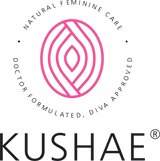This article is for informational purposes only. It is not, nor is it intended to be, a substitute for professional medical advice, diagnosis, or treatment and should never be relied upon for specific medical advice.
Sodium Benzoate is a preservative that can prolong shelf life when added to packaged foods, sodas, and even personal skincare products. There are a lot of mixed views on this organic compound. While some scientists believe sodium benzoate in skincare and cosmetics is harmless, others link it to cancers and various health issues. So, should Sodium Benzoate be in your skincare products? In this blog, Kushae Health aims to help you make an informed decision.
What is Sodium Benzoate?
Sodium Benzoate is widely known as a preservative for food to prevent molding. Importantly, used in a concentration of less than 0.5% by volume, sodium benzoate can be used in other products to extend their shelf life by at least two years from the date of purchase. It is an odorless, crystalline powder from reactions between benzoic acid and sodium hydroxide/ly. Though benzoic acid can be found in some fruits, plants, honey, and fermented foods, this combination does not happen naturally. Thus, this is a man-made compound that has been used in food preservation but has several other uses in many industries.
Why is Sodium Benzoate used in some products?
Sodium benzoate is a chemical that can be used for food preservation, beverage preservation, medicine, and others. It can be found in particular but not all processed foods, processed beverages, industrial products, medications, personal care, and cosmetic products.
- Foods & Beverages - In processed food and drinks, sodium benzoate acts as a preservative and is considered GRAS, Generally Recognized As Safe by the Food & Drug Administration (FDA). It is also approved internationally as a food additive. Because sodium benzoate stops the growth of likely harmful bacteria, mold, and other microbes, it is used in food and beverages to hinder spoilage, such as fruit yogurts, condiments, and diet soft drinks.
- Medications - In some prescribed and over-the-counter medications, such as cough syrups, sodium benzoate is used as a preservative. It is also used as a lubricant in pills to make them smoother and easier to break down after swallowing them. Sodium benzoate is also prescribed for patients with hyperammonemia (dangerously elevated blood levels of ammonia) and those with respiratory failure.
- Cosmetics & Personal Products - Sodium benzoate is a preservative in personal skincare and cosmetic products, such as soaps, shampoos, mouthwash, moisturizers, sunscreen, serums, and baby wipes. The chemical helps to lengthen their shelf life so that customers can enjoy their products longer.
- Other Usages - On the industrial side, sodium benzoate helps with inhibiting corrosion. And it can also be used to strengthen certain plastics and act as a stabilizer to process images.
Why Sodium Benzoate could be dangerous.
Several scientific studies have suggested that sodium benzoate may result in health issues, including elevated risks for inflammation, obesity, allergies, oxidative stress, and ADHD. In an animal study by Ciardi et al. (2012), the researchers indicate that food additives such as sodium benzoate may activate pro-inflammatory pathways in the body based on direct proportion to consumption amounts. Other researchers have suggested a linkage between ADHD and high consumption of beverages with sodium benzoate (Beezhold et al., 2014). It can also cause allergic reactions such as swelling and itching in some individuals.
Furthermore, sodium benzoate can possibly convert to a cancer agent called benzene in drinks with sodium benzoate and ascorbic acid, AKA vitamin C. Diet soft drinks, which contain sodium benzoate, are more likely to form benzene because it does not have the sugar found in fruit drinks and regular sodas that can reduce benzene formation. Further, products that are kept longer than the estimated shelf life and storage location (such as exposure to light and heat) increase the formation of this potential cancer agent, benzene. Though there is a safe limit of benzene in beverages, 5 parts per billion of benzene, there are not many studies about the long-term use of these beverages and the risks of cancer.
We do not use sodium benzoate in our products and prefer it that way. Next time you make a purchase, look over the ingredients to see how much sodium benzoate you may be consuming in your food and beverages, as well as the products you are putting on your body. Be careful of your sodium benzoate consumption and read more articles on this topic before you decide not to use products containing this chemical.
References
Beezhold BL, Johnston CS, Nochta KA. (2012). Sodium benzoate-rich beverage consumption is associated with increased reporting of ADHD symptoms in college students: a pilot investigation. J Atten Disord. 2014 Apr;18(3):236-41. doi: 10.1177/1087054712443156.
Ciardi C, Jenny M, Tschoner A, Ueberall F, Patsch J, Pedrini M, Ebenbichler C, Fuchs D. (2012). Food additives such as sodium sulphite, sodium benzoate and curcumin inhibit leptin release in lipopolysaccharide-treated murine adipocytes in vitro. Br J Nutr. 2012 Mar;107(6):826-33. doi: 10.1017/S0007114511003680. Raposa B, Pónusz R, Gerencsér G, Budán F, Gyöngyi Z, Tibold A, Hegyi D, Kiss I, Koller Á, Varjas T. Food additives: Sodium benzoate, potassium sorbate, azorubine, and tartrazine modify the expression of NFκB, GADD45α, and MAPK8 genes. Physiol Int. 2016 Sep;103(3):334-343. doi: 10.1556/2060.103.2016.3.6. PMID: 28229641.


















